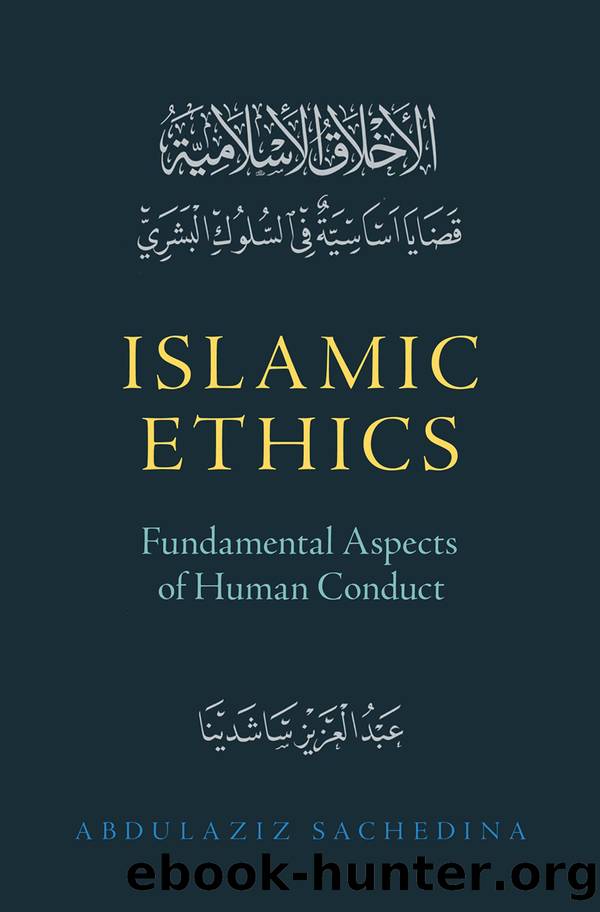Islamic Ethics by Sachedina Abdulaziz;

Author:Sachedina, Abdulaziz;
Language: eng
Format: epub
Publisher: Oxford University Press, Incorporated
Published: 2022-12-15T00:00:00+00:00
Theological Underpinnings of Juridical Discourse
In Islamic philosophical theology, the opposing conceptualization of human moral agency and ethical responsibility has paradoxically served as a conversation stimulator among Muslim modernist-secularist and traditionalist religious thinkers.22 These thinkers have confirmed or negated Islamâs ability to withstand modernist demands for the reformation of discriminatory rulings of classical juridical formulations about interhuman relationships to accommodate, for instance, constitutional democracy and universal human rights. The ongoing debates among traditionalist and modernist scholars about the relevance of certain questionable juridical decisions in the area of intercommunal relations and their disagreement about extending the notion of human dignity and the ensuing equality of all humans reveal a complex and contemporary development of Islamic religious thoughtâs preoccupation with individual autonomy in the context of the dominant traditionalist divine command ethics.
Islam, as Muslims understand it, is a comprehensive system of beliefs and practices that relates private and public, individual and society, spiritual and mundane. The best interests of humanity can be preserved when the two realms of spiritual and temporal work together in providing the values that regulate interhuman relationships in the public sphere. As a matter of fact, the prevalent doctrine about moral obligation in the scriptural sources speaks about the sense of responsibility generated by Godâs creation of humanity on earth. Human creation in the Qurâan reminds humanity about the two elements that make up the responsive human person, namely, the divine spirit (rūḥ) and the earth. These two elements serve as naturally endowed potentials to inspire a person to work diligently toward disciplining the self internally and providing imperatives of interaction externally by discharging responsibilities in society. Additionally, this reference has epitomized the union of body and spirit that generates the sense of accountability for maintaining equilibrium between the demands of the spirit and the body.23 In view of that, human relationships are at the heart of religiously inspired morality in which people learn to balance the challenging demands of mutual rights and obligations toward one another. As such, contradictory theological doctrines about moral epistemology do not undermine the naturally instilled need for fairness and justice in building social and political institutions that reflect that balance.
The groundwork for an inclusive foundational conception of equality of all human beings in the SharÄ«âa, then, can begin with a search for pluralistic formulations of the moral principle of public interest (istiá¹£lÄḥ, maá¹£laḥa) in juridical tradition and inherent human dignity and moral agency in theological interpretations. That there is room for such a foundational source for universal morality and human moral worth based on some of the pluralistic features of Islamic revelation and Muslim culture is dependent on the authenticity of my presentation of aspects of the inherited tradition that have been downplayed by contemporary traditionalist Muslim scholarship. Contemporary Muslim scholarship on Islamic creed and practice is oblivious to the Qurâanâs universal and, as yet, particularistic, message for humanity. This scholarship has intentionally overlooked or ignored the Qurâanic impulse that inspired juridical-ethical formulations about interpersonal justice in all religiously and morally required conduct.
Download
This site does not store any files on its server. We only index and link to content provided by other sites. Please contact the content providers to delete copyright contents if any and email us, we'll remove relevant links or contents immediately.
Application of a Novel Technique for Clinical Evaluation of Nitric Oxide-Induced Free Radical Reactions in ICU Patients by Unknown(696)
Rosenâs Emergency Medicine Concepts and Clinical Practice by Ron Walls; Robert Hockberger; Marianne Gausche-Hill; Timothy B. Erickson; Susan R. Wilcox(574)
Oxidative damage to surfactant protein D in pulmonary diseases by Vitality Starosta1 & Matthias Griese1†(410)
Social Science Perspectives on Global Public Health by Vincent La Placa & Julia Morgan(375)
Constructing Canine Consent; Conceptualising and Adopting a Consent-focused Relationship with Dogs by ERIN JONES(330)
Organic Chemistry: An Acid - Base Approach by MICHAEL SMITH(304)
ADVANCED EMERGENCY CARE AND TRANSPORTATION OF THE SICK AND INJURED by Unknown(272)
Saunders Nursing Drug Handbook 2024 - E-Book by Unknown(265)
Davis's Comprehensive Manual of Laboratory and Diagnostic Tests with Nursing Implications by Unknown(250)
Socio-Life Science and the COVID-19 Outbreak : Public Health and Public Policy by Makoto Yano; Fumihiko Matsuda; Anavaj Sakuntabhai; Shigeru Hirota(247)
Human Microanatomy; Cell Tissue and Organ Histology with Celebrity Medical Histories by Stephen A. Stricker(246)
Diagnostic and Statistical Manual of Mental Disorders, Fifth Edition, Text Revision (DSM-5-TR(tm)) by Unknown(246)
Berne and Levy Physiology E-Book by Unknown(237)
Replacing the Dead by Mie Nakachi;(232)
Handbook of Skin Disease Management by Jiyad Zainab;Flohr Carsten; & Carsten Flohr(230)
Access to Medicines and Vaccines in the South : Coherence of Rules and Policies Applied by the European Union Commission by Stephen Kingah(227)
Deep Learning and Medical Applications by Unknown(222)
The Pocket Guide to Sensorimotor Psychotherapy in Context (Norton Series on Interpersonal Neurobiology) by Pat Ogden(219)
Advances and Technical Standards in Neurosurgery by Unknown(215)
